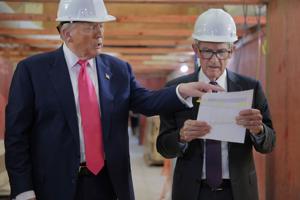The contentious relationship between the White House and the Federal Reserve has once again taken center stage, as recent threats by President Donald Trump to remove Federal Reserve Chair Jerome Powell highlight a delicate balance of power crucial to the nation’s economic stability.
President Trump has openly criticized Powell, specifically blaming him for the substantial cost overruns on the Federal Reserve’s headquarters renovation and, more significantly, for the pace of interest rate adjustments. These public condemnations underscore a president’s frustration with an independent institution, setting a modern precedent for such direct interference.
Trump’s insistence on lower interest rates stems from a desire to further boost the economy, believing it will protect his administration from economic fallout and improve public perception. This view aligns with a political strategy that prioritizes immediate economic stimulus over the Federal Reserve’s mandate for stable prices and maximum employment.
While Trump’s rhetoric may seem unique, presidential pressure on the Federal Reserve is not without historical precedent. Sixty years prior, President Lyndon B. Johnson famously summoned then-Fed Chair William McChesney Martin to his Texas ranch, exerting significant influence in a bid for lower borrowing costs to support his own economic agenda.
Similarly, two decades before Johnson, President Harry Truman engaged in a series of intense discussions with Federal Reserve chairs Marriner Eccles and Thomas McCabe. Truman pushed for reduced interest rates in the post-World War II era, facing resistance from both chairs who were wary of inflationary pressures.
What distinguishes the current situation is the explicit threat of ousting the Federal Reserve chair, a move that would be unprecedented in modern American history. Such an action carries immense risks, potentially undermining the global perception of the central bank’s independence and sending shockwaves through financial markets.
The Federal Reserve’s autonomy is considered vital for its ability to make monetary policy decisions free from short-term political pressures, ensuring long-term economic stability. Any perceived erosion of this independence could lead to diminished investor confidence, increased market volatility, and a less predictable economic environment.
Ultimately, the ongoing tension between the White House and the Federal Reserve underscores the critical importance of an independent central bank in a democratic society. It highlights the ongoing debate between political expediency and sound economic governance, a balance that remains crucial for the future of the nation’s financial health.






Leave a Reply